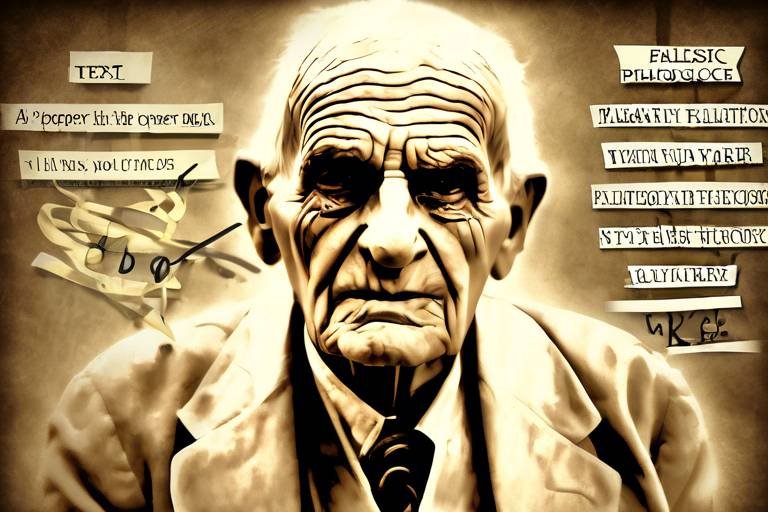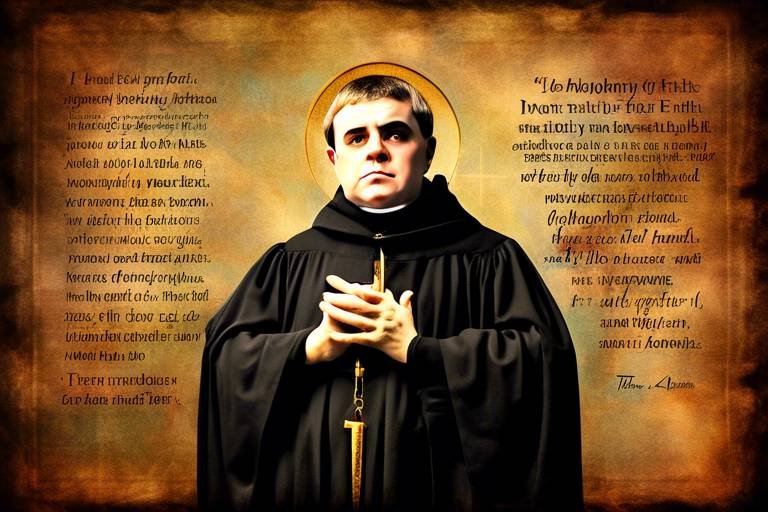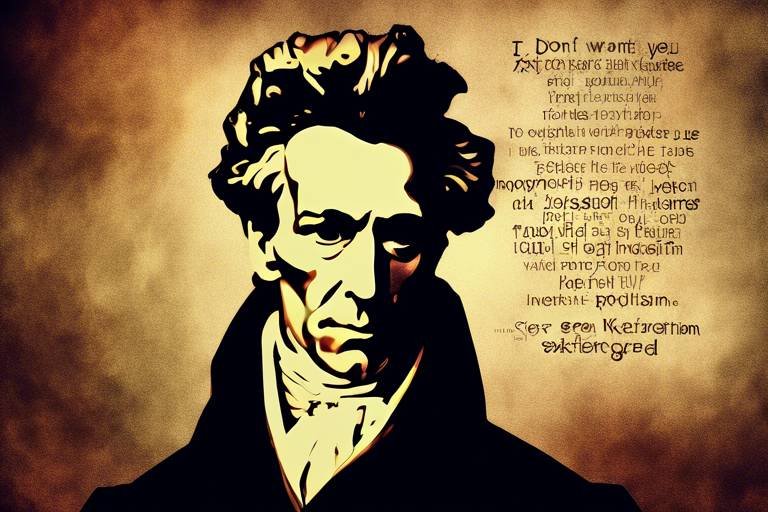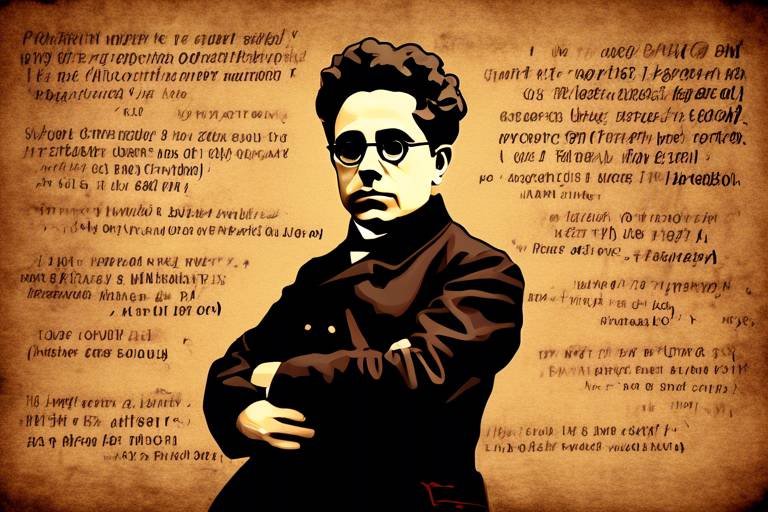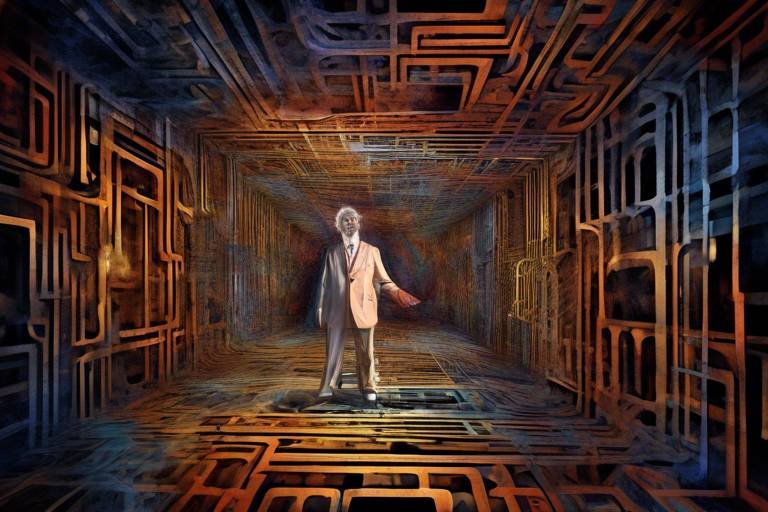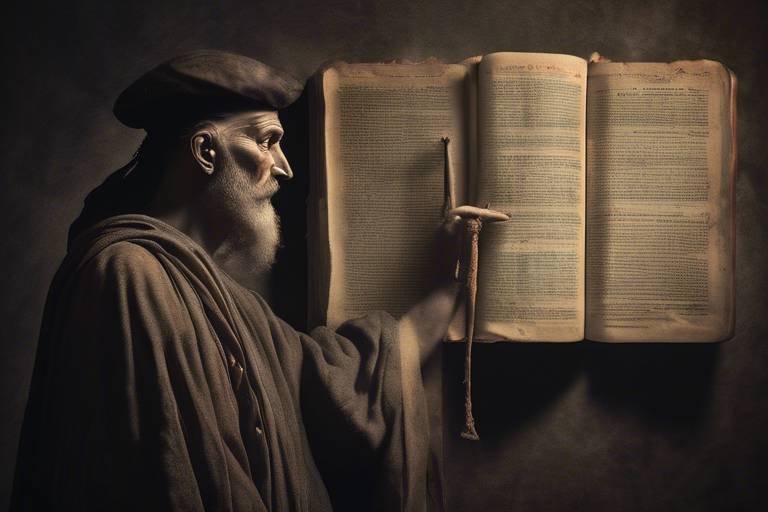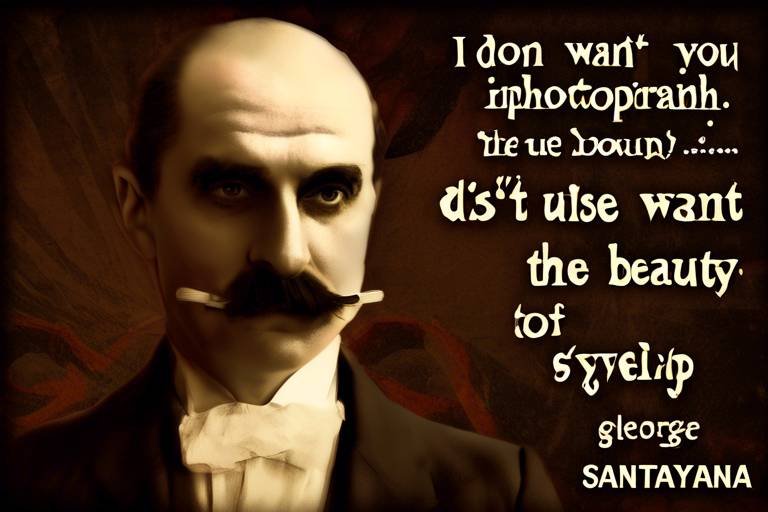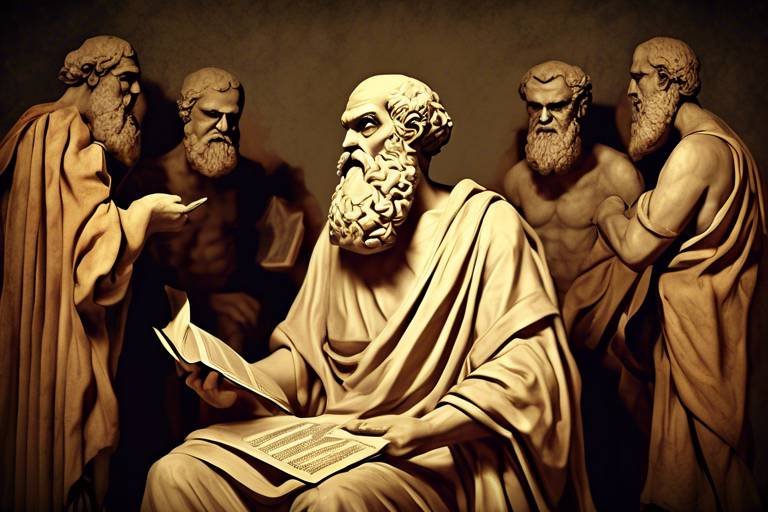Ludwig Feuerbach and his Critique of Christian Thought
Ludwig Feuerbach, a name that resonates through the corridors of philosophical debate, stands as a pivotal figure in the critique of Christian thought. His ideas challenged the very foundations of religious belief, prompting a radical rethinking of God and humanity's relationship with the divine. Imagine a world where the divine is not an all-powerful being, but rather a reflection of our deepest desires and aspirations. This is the essence of Feuerbach's argument, which invites us to reconsider not just the nature of God, but also our understanding of ourselves.
Born in 1804 in Landshut, Bavaria, Feuerbach was deeply influenced by the intellectual currents of his time. He was surrounded by the fervent discussions of German idealism, heavily influenced by thinkers like Hegel. However, unlike Hegel, who emphasized the absolute spirit and the unfolding of the divine in history, Feuerbach took a different path. His focus was not on the metaphysical but on the tangible, the human experience that shapes our understanding of existence. He believed that religion, particularly Christianity, was a projection of human qualities, a mirror reflecting our own nature back at us. This radical idea set the stage for his most famous work, The Essence of Christianity, where he laid bare his thoughts on the nature of God and humanity.
Feuerbach's philosophical journey was marked by a keen critique of religion, which he viewed as a construct of human imagination rather than a divine reality. He argued that God is not an external being, but rather an idealized version of human traits such as love, wisdom, and power. This perspective was revolutionary, as it suggested that instead of looking to the heavens for answers, we should turn inward and examine our own humanity. In essence, Feuerbach posited that the attributes we ascribe to God are merely reflections of our own qualities, desires, and fears.
In The Essence of Christianity, Feuerbach presents a compelling argument that fundamentally alters the perception of divinity. He asserts that the concept of God is a projection of human nature, a way for individuals to externalize their own attributes. This notion leads to the conclusion that religious beliefs are not rooted in an objective reality but are instead shaped by human experiences and emotions. Feuerbach's work invites us to ask, "What does our conception of God say about us?" This question not only challenges the traditional theistic viewpoint but also encourages a deeper exploration of our own identity.
Feuerbach's theory of the human projection of God suggests that we create God in our own image. Just as an artist reflects their emotions in their work, humans project their highest ideals onto a divine figure. This idea transforms the understanding of religion from a divine command to a human endeavor, where the divine becomes a canvas for our own aspirations. For Feuerbach, this realization is both liberating and unsettling, as it places the responsibility of understanding existence squarely on human shoulders.
Feuerbach's critique of theism challenges traditional notions of God as an omnipotent, omniscient entity. He argues that such beliefs often lead to a devaluation of human experience, as they encourage individuals to seek fulfillment outside themselves rather than within. By presenting a more human-centered view of existence, Feuerbach invites a reevaluation of what it means to be human in a world where the divine is not an external authority but an internal reflection.
The implications of Feuerbach's ideas are profound, influencing not only religious thought but also the rise of secularism and humanism in modern philosophy. His emphasis on human experience and emotion paved the way for thinkers who sought to understand the world without the constraints of religious dogma. The ripple effect of his critique can be seen in the works of later philosophers who grappled with the implications of a world where human beings are the architects of their own beliefs.
In addition to his critique of religion, Feuerbach's materialist approach stands in stark contrast to the idealist philosophies of his contemporaries. He emphasized the importance of the physical and tangible aspects of human existence, arguing that our understanding of the world should be grounded in material reality rather than abstract ideals. This focus on the material world invites a more pragmatic approach to philosophy, one that prioritizes human needs and experiences over metaphysical speculation.
Feuerbach's impact on later philosophers is undeniable. His critique of religion laid the groundwork for thinkers like Karl Marx and Friedrich Nietzsche, who drew from his ideas to develop their own philosophical paradigms. By challenging the foundations of religious belief, Feuerbach opened the door for a new era of thought that questioned the very nature of morality, existence, and the human condition.
Marx, in particular, integrated Feuerbach's ideas into his own theories regarding religion and society. He viewed religion as a reflection of economic structures, suggesting that it serves as a tool for social control. For Marx, understanding the material conditions of existence was crucial for grasping the role of religion in perpetuating inequality. This adaptation of Feuerbach's thought illustrates the profound impact his critique had on subsequent philosophical discourse.
Nietzsche's response to Feuerbach was one of rejection, as he embraced individualism and existentialism over religious morality. He argued that the death of God necessitated a re-evaluation of values, leading to a more authentic existence. While Nietzsche diverged from Feuerbach's ideas, he nonetheless acknowledged the significance of Feuerbach's critique in shaping modern thought.
Feuerbach's legacy continues to resonate in contemporary debates about religion, secularism, and humanism. His emphasis on the human experience as central to understanding existence invites ongoing discussions about the nature of belief and the role of religion in modern society. As we navigate the complexities of our existence, Feuerbach's insights remind us that the quest for meaning often begins within ourselves.
- Who was Ludwig Feuerbach? Ludwig Feuerbach was a 19th-century German philosopher known for his critique of religion and his materialist approach to philosophy.
- What is the main argument of Feuerbach's The Essence of Christianity? Feuerbach argues that God is a projection of human attributes and desires, reshaping the understanding of divinity.
- How did Feuerbach influence later philosophers? Feuerbach's critique of religion influenced thinkers like Karl Marx and Friedrich Nietzsche, who built upon his ideas to explore themes of humanism and existentialism.
- What is Feuerbach's view on theism? Feuerbach critiques traditional theism by suggesting that it detracts from human experience, proposing instead a more human-centered understanding of existence.

Feuerbach's Background and Philosophy
Ludwig Feuerbach was born on July 28, 1804, in Landshut, Bavaria, and his life was a testament to the tumultuous intellectual climate of 19th-century Europe. He was raised in a family that valued education and intellectual discourse, which undoubtedly shaped his philosophical inclinations. Feuerbach studied at the University of Erlangen, where he was deeply influenced by the works of German Idealists such as Hegel. However, unlike Hegel, who emphasized the abstract and the metaphysical, Feuerbach took a different path, focusing on the concrete realities of human existence.
Feuerbach's philosophy is often characterized by his critique of religion and the emphasis on human nature. He argued that understanding humanity is essential to understanding the divine. In his view, religion is not a divine revelation but rather a projection of human needs and desires. This radical shift in perspective opened the door to a more human-centered approach to philosophy and religion, one that challenged the prevailing notions of the time. His ideas can be summarized in a few key themes:
- Humanism: Feuerbach believed that human beings should be at the center of philosophical inquiry.
- Materialism: He emphasized the importance of the physical world and human experiences over abstract ideals.
- Critique of Theism: He challenged traditional views of God, proposing that deities are merely reflections of human qualities.
Feuerbach's most significant contribution to philosophy is perhaps his assertion that God is a projection of human attributes. In his seminal work, "The Essence of Christianity," he posits that the qualities we attribute to God—such as love, wisdom, and power—are actually manifestations of our own desires and aspirations. This idea not only critiques theistic beliefs but also invites individuals to reflect on their own nature and the essence of their humanity.
Moreover, Feuerbach's work emerged during a time when the Enlightenment had begun to challenge traditional authority and religious dogma. His philosophical stance laid the groundwork for later thinkers who would further explore the relationship between humanity and divinity. By advocating for a philosophy rooted in human experience rather than divine revelation, Feuerbach became a pivotal figure in the transition from religious to secular thought.
In summary, Ludwig Feuerbach's background and philosophy represent a significant shift in how we understand religion and humanity. His emphasis on humanism and materialism, coupled with his critique of traditional theism, not only reshaped philosophical discourse in his time but also continues to resonate in contemporary debates about the nature of existence and the role of religion in society.

The Essence of Christianity
Ludwig Feuerbach's seminal work, , challenges the very foundations of traditional religious thought. In this groundbreaking text, Feuerbach argues that the concept of God is not an external, divine entity, but rather a projection of human qualities and desires. He posits that humans have created God in their own image, reflecting their deepest aspirations, fears, and emotional needs. This radical perspective reshapes the understanding of divinity, suggesting that rather than being the ultimate authority, God is a mirror reflecting humanity's traits.
Feuerbach's argument can be summarized in several key points:
- Human Attributes as Divine: He claims that the attributes we assign to God—such as love, wisdom, and power—are inherently human qualities that we elevate to a divine status.
- Religion as Human Expression: Religion, in Feuerbach's view, is a manifestation of human emotions and yearnings, making it more about us than about an actual deity.
- The Role of Alienation: He discusses how the projection of human qualities onto God leads to a sense of alienation, as people distance themselves from their own nature by attributing it to a supernatural being.
This perspective invites a profound re-evaluation of how we understand spirituality and morality. If God is merely a reflection of human qualities, then the divine becomes a construct of human imagination rather than an absolute truth. This notion can be quite liberating, as it encourages individuals to embrace their humanity and recognize that moral and ethical standards are rooted in human experience rather than dictated by an external authority.
Feuerbach's critique does not stop at merely challenging the existence of God; it extends to the implications of such a belief on human relationships and society. By placing humanity at the center of moral consideration, he advocates for a more humanistic approach to ethics, one that prioritizes human welfare and social responsibility over adherence to religious dogma. This shift in perspective has far-reaching consequences for how individuals and societies approach questions of morality, justice, and community.
In essence, Feuerbach's exploration of Christianity serves as a clarion call for a more authentic understanding of human experience. By recognizing that our conception of the divine is rooted in our own nature, we can begin to dismantle the barriers that religion often erects between individuals and their true selves. This realization paves the way for a more inclusive and compassionate society, where human qualities are celebrated and understood as the foundation of our shared existence.
As we delve deeper into Feuerbach's ideas, it becomes clear that his critique is not merely an attack on religion but a profound invitation to explore what it means to be human. By embracing our qualities and desires, we can reshape our understanding of spirituality, paving the way for a future where humanism and compassion take center stage.
- What is the main argument of Feuerbach's The Essence of Christianity?
Feuerbach argues that God is a projection of human attributes and desires, suggesting that religion reflects human qualities rather than an external divine reality. - How does Feuerbach's philosophy impact modern thought?
His ideas have influenced secularism and humanism, encouraging a focus on human welfare and ethical considerations rooted in human experience rather than religious doctrine. - What is the significance of viewing God as a human projection?
This perspective allows for a more authentic understanding of spirituality, emphasizing the importance of human qualities and relationships over traditional religious authority.
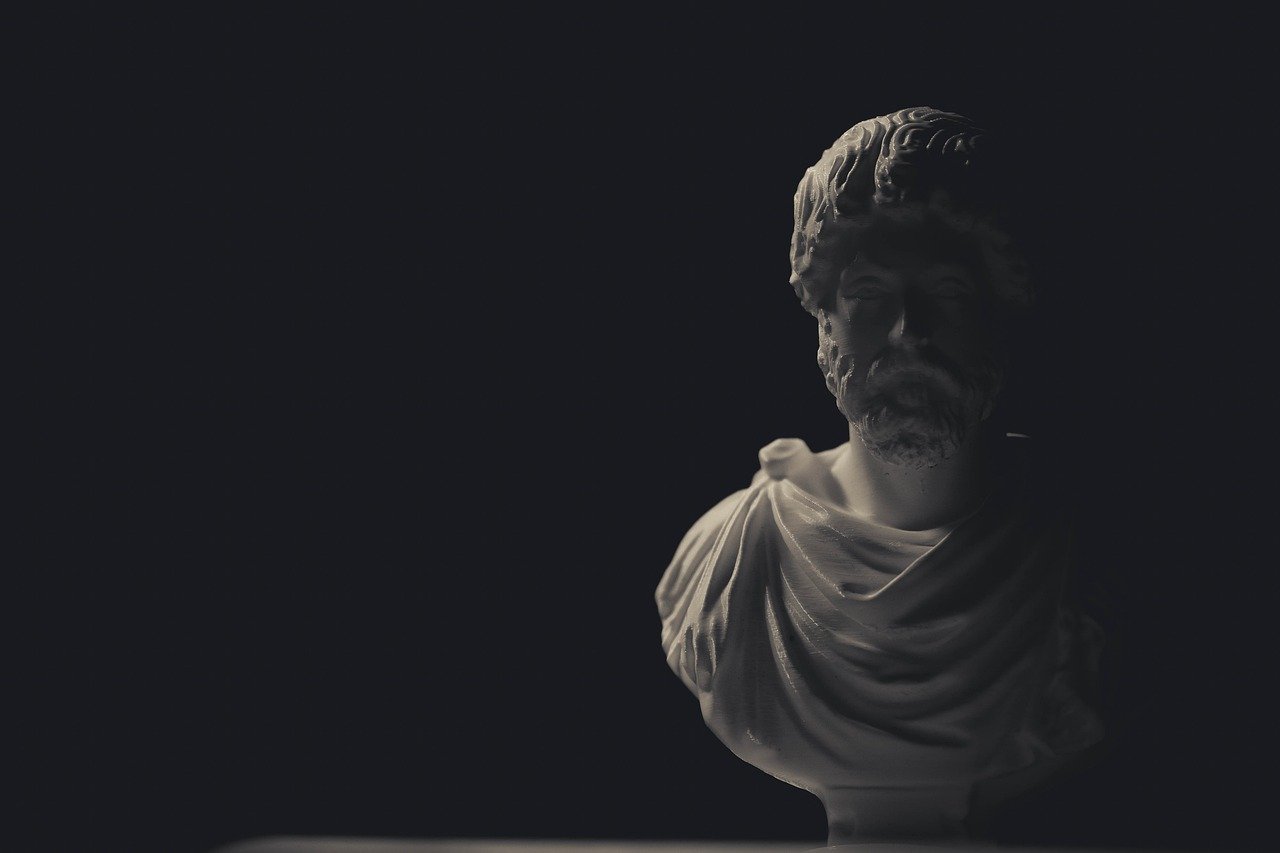
The Essence of Christianity,
Ludwig Feuerbach’s seminal work, The Essence of Christianity, is a profound exploration of the nature of religion and its relationship with humanity. In this groundbreaking text, Feuerbach presents a radical argument: that the concept of God is not an external reality but rather a projection of human attributes and desires. This idea reshapes our understanding of divinity, suggesting that our beliefs about God are reflections of our own qualities and aspirations. Imagine looking into a mirror and seeing not just your face but the very essence of your hopes, fears, and dreams. That’s what Feuerbach argues we do with God.
Feuerbach asserts that throughout history, humans have crafted deities that embody their own ideals. This notion leads to a striking conclusion: if God is merely a reflection of human nature, then the study of humanity becomes the key to understanding the divine. In this sense, religion is less about worshipping an external being and more about recognizing our own potential and limitations. It’s a fascinating twist that invites readers to reconsider not just their beliefs but the very foundation of religious thought.
In The Essence of Christianity, Feuerbach eloquently articulates his views, emphasizing that the attributes we ascribe to God—such as love, wisdom, and power—are indeed qualities we cherish and aspire to as human beings. He argues that this projection leads to a misunderstanding of both humanity and divinity. Instead of seeing God as a separate, transcendent being, Feuerbach encourages us to view God as a mirror reflecting our own nature. This perspective challenges traditional theistic beliefs and invites a more human-centered approach to existence.
Delving deeper into Feuerbach’s theory, we find that he posits the idea that humans create God in their own image. This concept is both liberating and daunting. On one hand, it empowers individuals to recognize their inherent qualities; on the other hand, it forces a confrontation with the darker aspects of human nature. The implications are significant: if God is a projection of humanity, then our understanding of morality, ethics, and purpose must also be reevaluated. Are we truly divine, or are we simply projecting our desires onto an imagined deity?
Feuerbach’s critique of theism is radical. He challenges the notion of a personal, interventionist God, arguing instead for a view of existence that places humanity at the center. By doing so, he dismantles the traditional understanding of religious authority and divine intervention. This shift not only questions the validity of religious dogma but also opens the door for a more humanistic perspective on life and existence. In Feuerbach’s view, to understand ourselves is to understand the divine, and this understanding can lead to a more fulfilling and authentic existence.
The ripple effects of Feuerbach’s ideas are profound. His work laid the groundwork for subsequent philosophical movements, including secularism and humanism. As thinkers began to embrace his critique, the landscape of religious thought shifted dramatically. The rise of secularism, characterized by a move away from religious explanations of the world, can be traced back to Feuerbach’s insistence on a human-centered understanding of existence. In this new paradigm, individuals are encouraged to seek meaning and purpose within themselves rather than relying on external religious frameworks.
In conclusion, The Essence of Christianity is not just a critique of religion; it is a call to recognize the power of human thought and experience. By understanding that our conception of God is a reflection of our own nature, we open the door to a deeper understanding of ourselves and our place in the universe. Feuerbach’s insights compel us to ask: What does it mean to be human? How do our desires shape our beliefs? And ultimately, how can we find meaning in a world that we create through our own projections?
- What is the main argument of Feuerbach's The Essence of Christianity?
- How does Feuerbach's philosophy challenge traditional religious beliefs?
- What impact did Feuerbach have on later philosophers?
Feuerbach argues that God is a projection of human attributes and desires, reshaping our understanding of divinity.
He challenges the notion of a personal, interventionist God, advocating for a more human-centered view of existence.
His ideas influenced thinkers like Karl Marx and Friedrich Nietzsche, paving the way for new philosophical paradigms that questioned religion.

is analyzed here, highlighting his argument that God is a projection of human attributes and desires, reshaping the understanding of divinity.
Ludwig Feuerbach's seminal work, The Essence of Christianity, serves as a pivotal exploration into the nature of divinity and human existence. In this groundbreaking text, Feuerbach argues that the concept of God is not an external, transcendent being but rather a projection of human attributes and desires. This radical assertion reshapes our understanding of divinity, suggesting that the qualities we attribute to God are, in fact, reflections of our own human nature. Imagine looking into a mirror; what you see is not the mirror itself but the image it reflects. Similarly, Feuerbach posits that God is a reflection of humanity—a mirror that displays our deepest aspirations, fears, and qualities.
To elaborate on this idea, Feuerbach suggests that the divine characteristics we admire—such as love, goodness, and wisdom—are essentially human ideals that we project onto a supernatural being. This means that when we worship God, we are, in essence, worshipping our own potential and the best aspects of ourselves. This perspective not only challenges traditional religious views but also invites a more human-centered approach to understanding spirituality.
Feuerbach's argument can be summarized in a few key points:
- Projection of Human Qualities: The attributes we assign to God—like omnipotence and benevolence—are derived from our own human experiences and desires.
- Human Needs and Aspirations: Religion fulfills a psychological need, allowing individuals to express their hopes and fears through the figure of God.
- Rejection of Transcendence: By viewing God as a projection, Feuerbach dismisses the idea of a separate, transcendent deity, advocating instead for a more grounded understanding of spirituality.
This perspective leads to profound implications for how we view religion and our place in the world. If God is a reflection of humanity, then the act of worship becomes an exploration of our own nature rather than a submission to an external authority. Feuerbach's ideas challenge believers to reconsider their relationship with the divine and to see it as an opportunity for self-discovery rather than mere obedience. In this light, spirituality transforms from an obligation into a personal journey, inviting individuals to explore their own values and aspirations deeply.
By reshaping the understanding of divinity, Feuerbach not only critiques traditional theism but also opens the door for a more secular and humanistic approach to philosophy and religion. This shift encourages individuals to find meaning and purpose within themselves rather than in an external deity, fostering a sense of empowerment and self-realization.
- What is Feuerbach's main argument in The Essence of Christianity? Feuerbach argues that God is a projection of human attributes and desires, challenging traditional views of a transcendent deity.
- How does Feuerbach's philosophy affect our understanding of religion? By viewing God as a reflection of humanity, religion becomes a means of self-exploration rather than mere obedience to a higher power.
- What implications does Feuerbach's work have for modern humanism? Feuerbach's ideas pave the way for a more secular and human-centered approach to philosophy, emphasizing individual potential and self-discovery.

Human Projection of God
When we dive into the depths of Ludwig Feuerbach's philosophy, one of the most captivating ideas he presents is the concept of the . Imagine, if you will, a vast mirror reflecting not just our faces but our innermost desires, fears, and aspirations. Feuerbach argues that God is not some distant, ethereal being but rather a creation of humanity itself. This notion suggests that the attributes we ascribe to God—love, justice, mercy—are actually reflections of our own human qualities. In essence, we craft a deity in our image, filling the divine with our hopes and dreams.
Feuerbach's argument hinges on the idea that as we grapple with our existence, we project our own traits onto a divine figure, thus creating a God that embodies our collective yearnings. This projection serves several purposes:
- Comfort: The idea of a benevolent God can provide solace in times of distress, acting as a psychological crutch during life's challenges.
- Morality: By attributing moral qualities to God, we establish a framework for ethical behavior that aligns with our societal values.
- Identity: Our conception of God can reflect our cultural and personal identities, shaping how we see ourselves in relation to the universe.
To illustrate this concept further, consider how different cultures envision their gods. In ancient Greece, the gods were anthropomorphic, displaying human-like emotions and flaws, while in Eastern philosophies, the divine may embody more abstract principles. This variability underscores Feuerbach's point: the divine is a canvas upon which humanity paints its values and aspirations.
Moreover, Feuerbach challenges us to question the very nature of our beliefs. If God is merely a projection of human qualities, what does that say about the foundations of our faith? Are we worshipping an ultimate truth, or are we simply venerating a reflection of ourselves? This inquiry invites a profound re-evaluation of religious practices and beliefs, urging individuals to seek authenticity in their spiritual journeys.
In a world where many still cling to traditional theistic views, Feuerbach's insights offer a refreshing perspective. His assertion that religion is essentially a mirror of humanity encourages a shift towards a more human-centered approach to existence. It compels us to recognize our shared humanity, fostering empathy and understanding across different belief systems.
Ultimately, the idea of the human projection of God not only reshapes our understanding of divinity but also invites us to explore the rich tapestry of human experience. By acknowledging that our conceptions of God are intertwined with our own nature, we can cultivate a deeper appreciation for the complexities of belief and the profound connections that bind us all.
- What does Feuerbach mean by "human projection of God"?
Feuerbach suggests that the qualities we attribute to God are reflections of our own human traits and desires, indicating that we create God in our image. - How does this idea affect religious beliefs?
This perspective challenges traditional notions of a transcendent God and encourages individuals to seek a more authentic understanding of their faith. - Can this concept coexist with traditional theism?
While some may find it incompatible, others may view it as an opportunity to deepen their understanding of spirituality and humanity.

Critique of Theism
Ludwig Feuerbach's critique of theism is nothing short of revolutionary. He boldly challenges the traditional notions of God that have been upheld for centuries, arguing that these views are not only flawed but also deeply human-centered. Feuerbach posits that the concept of God is essentially a reflection of human traits and desires, rather than an objective reality existing independently of humanity. This perspective invites us to reconsider the very foundations of religious belief and the role it plays in our lives.
Feuerbach argues that the attributes we ascribe to God—such as love, justice, and omnipotence—are actually human qualities that we project onto an imagined deity. This projection serves a dual purpose: it allows individuals to express their highest aspirations while simultaneously distancing themselves from their own limitations. Rather than seeing God as a separate, transcendent being, Feuerbach encourages us to view the divine as an embodiment of our collective humanity. In this sense, religion becomes a mirror, reflecting our own nature back at us, rather than an external truth.
To illustrate this idea, Feuerbach contrasts theistic beliefs with a more humanistic approach. He suggests that if we were to strip away the supernatural elements of religion, what remains is a rich tapestry of human experience and emotion. This leads to profound implications for how we understand morality, purpose, and existence. By recognizing that we are the creators of our own gods, we can reclaim agency over our lives and beliefs. The theistic framework, according to Feuerbach, limits our understanding of ourselves and our potential.
Feuerbach's critique also extends to the implications of theistic beliefs on society. He argues that traditional religions often promote a passive acceptance of suffering and injustice by framing them as tests of faith or divine will. This can lead to a complacency that hinders social progress and the pursuit of genuine happiness. In contrast, a human-centered philosophy encourages individuals to take responsibility for their actions and the world around them. It fosters a sense of community and solidarity, as people come together to address shared challenges rather than relying on an abstract deity to intervene.
In summary, Feuerbach's critique of theism invites us to rethink our understanding of God and religion. By recognizing that our beliefs are projections of our own attributes, we can begin to see the potential for a more compassionate and responsible approach to existence. This shift not only has profound implications for individual belief systems but also for the broader societal structures that are influenced by religious thought.
As we navigate through modern debates surrounding religion and secularism, Feuerbach's insights remain remarkably relevant. They challenge us to confront the uncomfortable truths about our beliefs and to embrace a more humanistic worldview that prioritizes the well-being of humanity over the worship of an abstract deity.
- What is Feuerbach's main argument against theism?
Feuerbach argues that the concept of God is a projection of human qualities and desires, rather than an independent reality. - How does Feuerbach's critique impact our understanding of morality?
His critique suggests that morality should be based on human experience and empathy, rather than divine commandments. - What are the societal implications of Feuerbach's ideas?
Feuerbach's ideas encourage individuals to take responsibility for their actions and promote social progress rather than relying on divine intervention.

Impact on Religious Thought
Ludwig Feuerbach's critique of Christianity didn't just rattle the cages of religious thought; it sent shockwaves through the entire philosophical landscape. His assertion that God is essentially a projection of human desires and attributes challenged the very foundation upon which traditional theism stood. Imagine for a moment that the divine is not an external entity but a mirror reflecting our own hopes, fears, and aspirations. This radical perspective forced theologians and philosophers alike to rethink the nature of divinity and humanity's relationship with it.
Feuerbach's ideas paved the way for a more human-centered understanding of existence, effectively shifting the focus from the supernatural to the natural world. By positing that religion is a manifestation of human needs, he opened the door for secularism and humanism to flourish. No longer was God seen as an omnipotent figure dictating morality from above; instead, morality became a human construct, shaped by our collective experiences and needs.
In a world where faith often dictated the norms of society, Feuerbach's work acted as a catalyst for change. His theories encouraged individuals to question the dogmas they had been taught, leading to an intellectual awakening that resonated through the ages. This shift was not merely academic; it had profound implications for how communities viewed ethics, morality, and the very essence of what it means to be human.
Furthermore, Feuerbach's influence can be seen in the rise of secular humanism, a philosophy that prioritizes human values and concerns over religious doctrines. This movement, which gained momentum in the 19th and 20th centuries, embraced the idea that humans are capable of moral reasoning without divine intervention. In essence, Feuerbach helped lay the groundwork for a worldview where humanity is at the center, rather than an external deity.
To illustrate the impact of Feuerbach's ideas on religious thought, consider the following table that summarizes key shifts in philosophical perspectives:
| Traditional Theism | Feuerbach's Perspective |
|---|---|
| God as an external, omnipotent being | God as a projection of human qualities |
| Morality dictated by divine command | Morality as a human construct |
| Faith as the highest virtue | Reason and human experience as guiding principles |
As Feuerbach's ideas took root, they inspired a wave of thinkers who sought to explore the implications of his critique further. The evolution of religious thought in the wake of his work has been profound, leading to a more nuanced understanding of spirituality and ethics. Today, many continue to grapple with the questions he raised, reflecting on the role of religion in an increasingly secular world.
In essence, Feuerbach's critique not only transformed the landscape of religious thought but also ignited a broader conversation about what it means to be human in a world where the divine is no longer the ultimate authority. His legacy is a reminder that questioning established beliefs can lead to a richer, more fulfilling understanding of our existence.
- What was Ludwig Feuerbach's main argument? Feuerbach argued that God is a projection of human attributes, emphasizing that religion reflects human desires and qualities.
- How did Feuerbach influence modern philosophy? His ideas paved the way for secularism and humanism, encouraging a shift from supernatural explanations to human-centered reasoning.
- What impact did Feuerbach have on later thinkers like Marx and Nietzsche? Feuerbach's critique of religion influenced Marx's views on the role of religion in society and Nietzsche's rejection of religious morality.

Feuerbach and Materialism
Ludwig Feuerbach’s approach to philosophy is deeply rooted in materialism, a perspective that emphasizes the tangible, physical aspects of existence over abstract ideals. In a world where many philosophical discourses veered towards the ethereal, Feuerbach stood out like a lighthouse in a storm, guiding us back to the essence of human experience. He argued that our understanding of reality should be grounded in the material world rather than in the realms of abstract thought or spiritual speculation. This stance was revolutionary, as it challenged the dominant idealist philosophies of his time, which often prioritized ideas over the concrete experiences of life.
Feuerbach believed that human beings are fundamentally physical creatures, and thus, our thoughts, emotions, and beliefs are shaped by our material conditions. He posited that the essence of humanity is rooted in our physical existence, and any philosophical inquiry that neglects this foundation risks becoming detached from reality. For Feuerbach, the material world is not just a backdrop to human life; it is the very fabric from which our thoughts and beliefs are woven. He famously stated, “Man is what he eats,” encapsulating the idea that our physical needs and experiences directly influence our consciousness and societal structures.
Moreover, Feuerbach’s materialism extends into his critique of religion. He argued that religious beliefs are often a projection of human needs and desires, reflecting our hopes and fears. For instance, the notion of an all-powerful deity can be seen as an expression of humanity’s longing for security and control in an unpredictable world. In this way, Feuerbach effectively flipped the script on traditional theism, suggesting that instead of God creating humanity, it is humanity that creates God, molding the divine in our own image. This perspective invites us to reconsider not only our understanding of religion but also the very nature of existence itself.
Feuerbach’s ideas can be summarized in the following key points:
- Human Experience: The material world shapes our thoughts and beliefs.
- Projection of Needs: Religious concepts are reflections of human desires.
- Critique of Idealism: Emphasizes the importance of the physical over the abstract.
This materialist viewpoint has profound implications. It encourages a focus on human needs in the here and now, rather than deferring meaning to an afterlife or spiritual realm. In doing so, Feuerbach paved the way for a more human-centered philosophy that prioritizes the lived experiences of individuals. His emphasis on the material aspects of life resonates strongly with contemporary discussions surrounding social justice, economic inequality, and human rights, as it underscores the importance of addressing the physical conditions that shape human existence.
In essence, Feuerbach’s materialism serves as a reminder that our understanding of the world must be grounded in the reality of our experiences. By shifting the focus from abstract ideals to the concrete aspects of human life, he challenges us to rethink our beliefs and the very foundations of our societies. This approach not only enriches philosophical discourse but also provides a framework for addressing the pressing issues of our time.

Influence on Later Philosophers
Ludwig Feuerbach's philosophical contributions did not fade into obscurity after his time; instead, they ignited a spark that would influence a myriad of thinkers in the years that followed. His radical ideas about religion and humanity's relationship with the divine resonated deeply, leading to a reevaluation of traditional philosophical and theological frameworks. Feuerbach's assertion that God is merely a reflection of human qualities and desires challenged the very foundations of theistic thought, paving the way for a more secular understanding of existence.
One of the most notable figures influenced by Feuerbach was Karl Marx. Marx took Feuerbach's critique of religion and expanded it into his own revolutionary theories. He argued that religion was not only a projection of human needs but also a tool used by the ruling classes to maintain power. In his view, religion served as an opiate for the masses, dulling their awareness of economic and social inequalities. This adaptation of Feuerbach's ideas allowed Marx to formulate a more comprehensive critique of society, linking religion directly to economic structures and class struggles.
Another philosopher who found inspiration in Feuerbach's work was Friedrich Nietzsche. While Nietzsche's approach diverged significantly from Feuerbach's humanism, he nonetheless acknowledged the impact of Feuerbach's ideas on his own thinking. Nietzsche rejected the notion of a transcendent God and instead championed the idea of the "Übermensch" or "Overman," advocating for individualism and personal responsibility. In doing so, he positioned himself against the moral frameworks established by traditional religions, which he believed stifled human potential.
The influence of Feuerbach extended beyond these two giants. His ideas inspired a generation of philosophers who sought to explore the implications of a world where the divine was not an external authority but rather an internal manifestation of human experience. This shift towards a more human-centered philosophy can be seen in various movements, including existentialism and humanism, which prioritize individual experience and the inherent value of human life.
In essence, Feuerbach's critique of religion was not just a rejection of God; it was a call to action for humanity to recognize its own power and potential. By understanding religion as a human construct, later philosophers were empowered to explore new avenues of thought that emphasized human agency, creativity, and the quest for meaning in a seemingly indifferent universe.
- What was Ludwig Feuerbach's main argument against religion?
Feuerbach argued that God is a projection of human attributes and desires, meaning that religious beliefs reflect human nature rather than an external divine reality. - How did Feuerbach influence Karl Marx?
Marx integrated Feuerbach's ideas into his critique of religion, viewing it as a tool for social control that obscured the realities of economic exploitation. - What is Nietzsche's relationship with Feuerbach's ideas?
Nietzsche acknowledged Feuerbach's impact but ultimately rejected religious morality in favor of individualism and the concept of the Übermensch. - Why is Feuerbach's work still relevant today?
Feuerbach's emphasis on humanism and critique of traditional religious beliefs continue to resonate in contemporary discussions about secularism and the nature of existence.
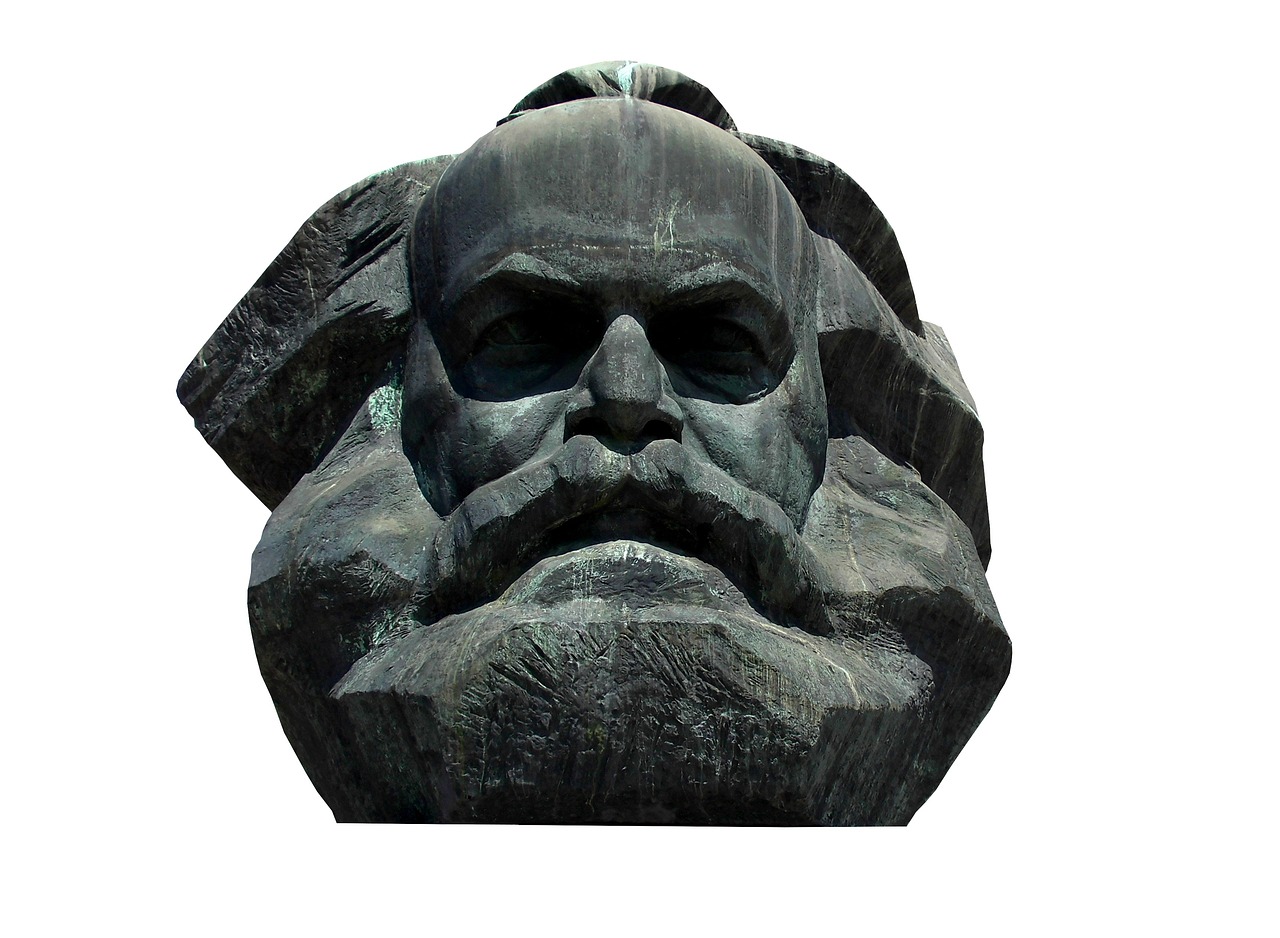
Marx's Adaptation of Feuerbach
When we dive into the intellectual waters of Karl Marx, we find that he was significantly influenced by the ideas of Ludwig Feuerbach. Marx's adaptation of Feuerbach's theories is pivotal in understanding how he perceived the relationship between religion and society. Feuerbach argued that God is essentially a projection of human qualities and desires, a notion that resonated deeply with Marx. However, Marx took this idea a step further, intertwining it with his critical analysis of society and economics.
In Feuerbach's view, religion is a reflection of human nature; it embodies our fears, hopes, and aspirations. Marx, however, saw this as only part of the picture. He believed that religion was not just an individual projection but also a social construct that served specific economic and political functions. For Marx, religion was the "opium of the people," a means to pacify the masses and distract them from the harsh realities of their socio-economic conditions. This perspective marked a significant shift from Feuerbach's more humanistic interpretation to a critique that emphasized the material conditions of life.
Marx's adaptation can be summarized in several key points:
- Social Context: Marx emphasized that religion cannot be understood in isolation from the socio-economic context in which it exists. He argued that the material conditions of life shape human consciousness, including religious beliefs.
- Class Struggle: For Marx, religion often served the interests of the ruling class by justifying the status quo. He believed that religious institutions could perpetuate inequality and hinder social progress.
- Emancipation through Materialism: While Feuerbach focused on human attributes, Marx proposed that true emancipation could only occur through a materialist understanding of the world, leading to the overthrow of oppressive systems.
In essence, Marx acknowledged Feuerbach's insights but critiqued their limitations. He viewed religion as a complex interplay of human aspirations and social realities, rather than merely a reflection of individual psychology. This nuanced perspective allowed Marx to frame religion as not just a personal belief system but as a powerful tool that could either liberate or bind individuals, depending on the context.
Moreover, Marx's adaptation of Feuerbach's ideas laid the groundwork for his broader critique of capitalism. He argued that just as religion could obscure the realities of class struggle, so too could capitalist ideologies mask the exploitation inherent in economic systems. In this way, Marx transformed Feuerbach's human-centered philosophy into a revolutionary framework that sought to address the material inequalities of his time.
Ultimately, the relationship between Marx and Feuerbach is a fascinating study of how philosophical ideas evolve and adapt. Marx's insights not only enriched his own theories but also challenged subsequent thinkers to reconsider the role of religion in society. By integrating Feuerbach's critique of religion with his own analysis of economic structures, Marx forged a path that would influence generations of philosophers, sociologists, and political theorists.
- How did Feuerbach influence Marx's views on religion? Feuerbach's idea that God is a projection of human qualities resonated with Marx, who expanded this notion to critique the socio-economic functions of religion.
- What did Marx mean by "opium of the people"? Marx used this phrase to describe religion as a tool that pacifies the masses and distracts them from the realities of their socio-economic conditions.
- How did Marx's approach differ from Feuerbach's? While Feuerbach focused on individual human attributes, Marx emphasized the social and economic contexts that shape beliefs and practices, viewing religion as a tool of class struggle.
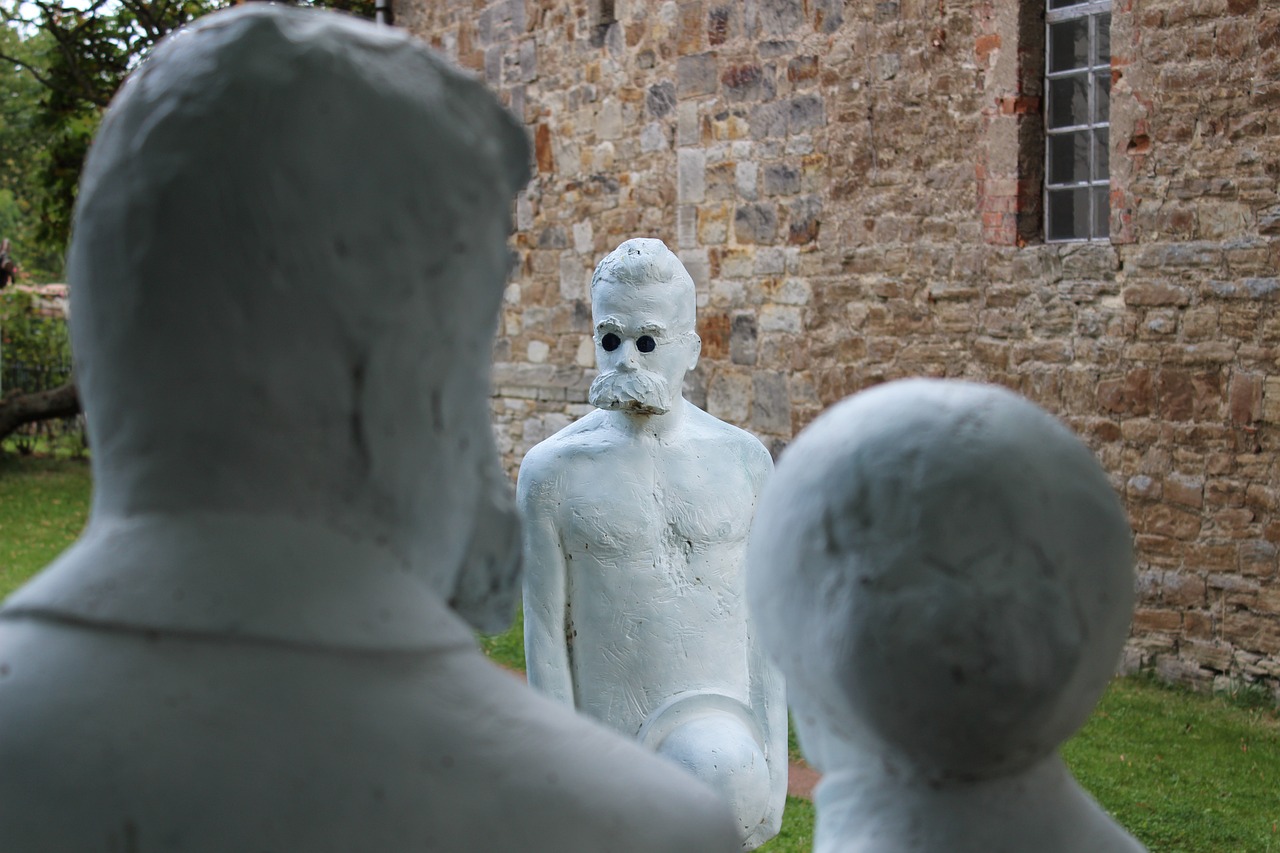
Nietzsche's Rejection of Religion
Friedrich Nietzsche, often hailed as one of the most provocative philosophers of the 19th century, took a bold stance against organized religion, particularly Christianity. His famous proclamation that “God is dead” encapsulates a radical departure from traditional religious beliefs, suggesting that the decline of religious authority would pave the way for a new era of human thought and existence. But what does this really mean? Nietzsche wasn't just making a statement about the existence of God; he was critiquing the very foundations of morality and values that religions, especially Christianity, had imposed on society.
At the heart of Nietzsche's philosophy lies the concept of the "Übermensch," or "Overman," which represents an individual who transcends the limitations imposed by conventional morality, particularly those derived from religious doctrines. For Nietzsche, the rejection of religion is not merely about disbelief; it is about embracing a life that is authentic, creative, and free from the constraints of societal norms. He believed that religion often stifles human potential by promoting guilt, conformity, and a sense of sinfulness. Instead, he advocated for a life-affirming philosophy that celebrates human creativity and the pursuit of power as a means of overcoming life's inherent challenges.
Nietzsche also critiqued the moral absolutism that religions tend to endorse. He argued that morality should not be dictated by divine command but should be understood as a human construct that evolves with society. This perspective aligns with Feuerbach’s notion that God is a projection of human desires; however, Nietzsche takes it a step further by asserting that we must create our own values rather than relying on a supernatural authority. In his view, the absence of God opens the door to a more dynamic understanding of morality, one that is adaptable and reflective of human experiences.
Moreover, Nietzsche's rejection of religion is intricately linked to his critique of nihilism, the belief that life lacks inherent meaning or value. He saw the potential for nihilism to arise in a world where traditional religious beliefs were crumbling. However, rather than succumbing to despair, Nietzsche urged individuals to embrace this existential crisis as an opportunity to forge their own meaning and purpose. He famously stated, “He who has a why to live can bear almost any how,” emphasizing the importance of personal meaning in a seemingly indifferent universe.
In summary, Nietzsche's rejection of religion is not merely an attack on faith; it is a call to arms for individuals to reclaim their power, redefine their values, and embrace the chaos of existence. His ideas resonate deeply with contemporary discussions about secularism and the role of religion in modern society, encouraging a shift from dogma to a more individualized, human-centric approach to morality and life. As we navigate the complexities of our own beliefs and values today, Nietzsche's insights serve as a powerful reminder of the importance of questioning established norms and seeking authenticity in our lives.
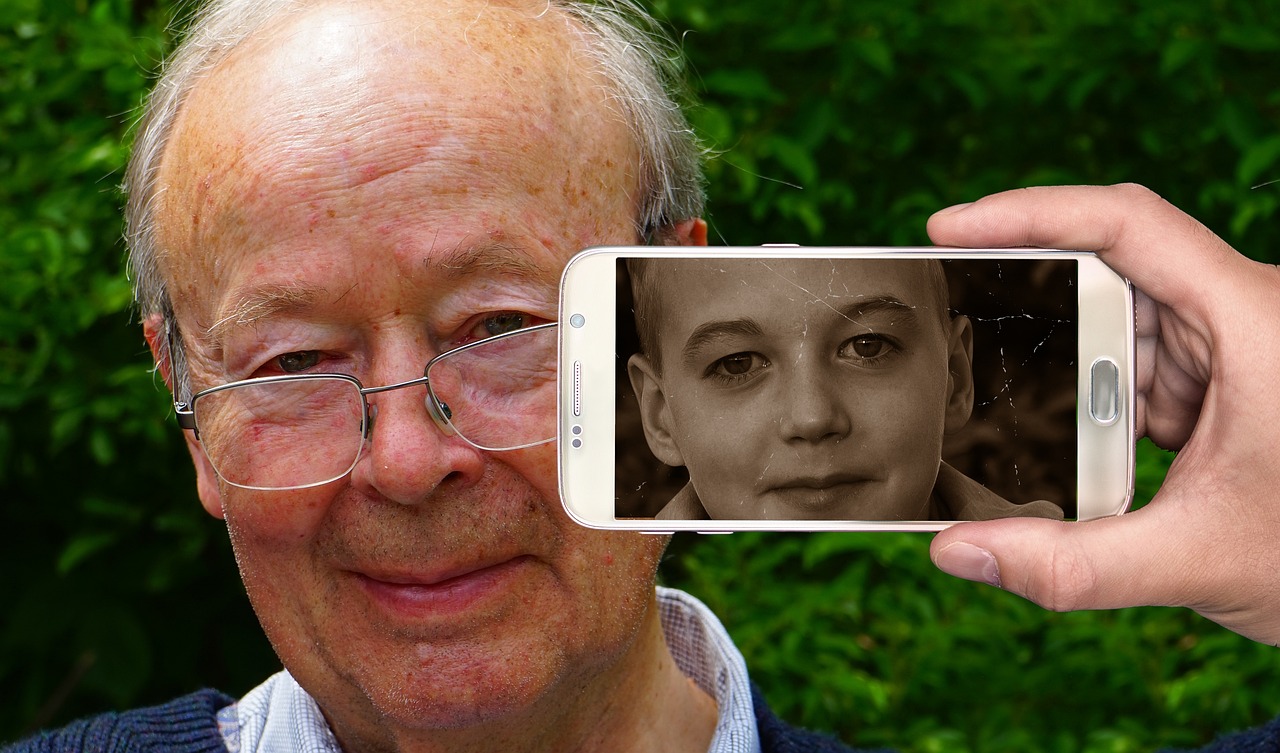
Legacy and Contemporary Relevance
Ludwig Feuerbach's legacy is a fascinating tapestry woven into the fabric of modern philosophical discourse. His critique of religion and exploration of humanism have not only influenced philosophers of his time but continue to resonate profoundly in contemporary society. As we navigate through the complexities of modern life, Feuerbach’s ideas compel us to examine the essence of our beliefs and the nature of our existence.
One of the most significant aspects of Feuerbach’s legacy is his assertion that God is a projection of human qualities. This notion challenges us to reflect on our own attributes and desires, essentially asking, "What does our conception of divinity say about us?" In a world where religious dogma often dictates moral and ethical standards, Feuerbach’s human-centered approach encourages a more introspective examination of our values and motivations.
Furthermore, Feuerbach's work laid the groundwork for the rise of secularism. In an age where science and rational thought increasingly take precedence over religious explanations, his ideas offer a bridge between the spiritual and the material. By emphasizing the tangible aspects of human existence, Feuerbach invites us to embrace a more grounded understanding of our lives, one that prioritizes human experience over divine abstraction.
In contemporary discussions about religion, secularism, and humanism, Feuerbach's influence is unmistakable. His critique of religious orthodoxy has inspired a plethora of movements that advocate for a more secular society. For instance, the rise of humanist organizations around the globe reflects a growing desire to find meaning and purpose outside traditional religious frameworks.
To illustrate this impact, consider the following table that outlines key areas where Feuerbach's ideas have shaped modern thought:
| Area of Influence | Feuerbach's Contribution | Contemporary Relevance |
|---|---|---|
| Secularism | Critique of religious dogma | Growing secular movements and policies |
| Humanism | Emphasis on human attributes | Rise of humanist philosophies and organizations |
| Philosophy | Materialist approach to existence | Influence on existentialism and postmodern thought |
Moreover, Feuerbach’s ideas have found their way into contemporary debates surrounding ethics and morality. As society grapples with complex moral dilemmas, his emphasis on human experience serves as a reminder that our ethical frameworks should be rooted in empathy and understanding rather than archaic doctrines. This perspective is particularly relevant in discussions about social justice, where the focus on human dignity and rights echoes Feuerbach’s belief in the importance of human experience.
In summary, Ludwig Feuerbach's legacy continues to shape our understanding of religion, humanism, and ethics. His critique of traditional religious thought encourages us to question our beliefs and explore the depths of human experience. As we face the challenges of the modern world, his ideas remain a vital part of the conversation, reminding us that our search for meaning is inherently a human endeavor.
- What was Ludwig Feuerbach's main argument? Feuerbach argued that God is a projection of human attributes and desires, reshaping our understanding of divinity.
- How did Feuerbach influence modern philosophy? His critiques paved the way for secularism and humanism, influencing thinkers like Karl Marx and Friedrich Nietzsche.
- Why is Feuerbach relevant today? His ideas encourage a human-centered approach to ethics and morality, which is increasingly important in contemporary discussions about religion and society.
Frequently Asked Questions
- Who was Ludwig Feuerbach?
Ludwig Feuerbach was a German philosopher born in 1804, known for his critique of religion and his influence on humanism and secular thought. He challenged traditional religious beliefs, arguing that God is a projection of human qualities and desires.
- What is the main idea of Feuerbach's "The Essence of Christianity"?
In "The Essence of Christianity," Feuerbach posits that God is not an independent being but rather a reflection of human nature. He suggests that our attributes, aspirations, and needs shape our conception of divinity, making religion a mirror of humanity itself.
- How did Feuerbach critique theism?
Feuerbach critiqued theism by arguing that traditional notions of God are flawed because they do not account for the human experience. He emphasized a human-centered view of existence, suggesting that religion should focus on human values and experiences rather than on an abstract deity.
- What impact did Feuerbach have on later philosophers?
Feuerbach's ideas significantly influenced later thinkers, including Karl Marx and Friedrich Nietzsche. His critique of religion opened the door for new philosophical paradigms, leading to discussions about secularism, materialism, and individualism in modern philosophy.
- How did Marx adapt Feuerbach's ideas?
Marx integrated Feuerbach's critique of religion into his own theories by examining how religious beliefs relate to economic structures. He viewed religion as a reflection of societal conditions and a tool used to maintain the status quo, ultimately advocating for a materialist approach to understanding society.
- What was Nietzsche's response to Feuerbach?
Nietzsche responded to Feuerbach by rejecting religious morality and embracing individualism and existentialism. He saw Feuerbach's ideas as a step toward overcoming traditional values but believed that true liberation required a complete rejection of all forms of religious thought.
- Why is Feuerbach's legacy relevant today?
Feuerbach's legacy remains relevant as contemporary debates about religion, secularism, and humanism continue to evolve. His emphasis on human attributes and experiences invites ongoing discussions about the role of religion in modern society and the nature of human existence.


